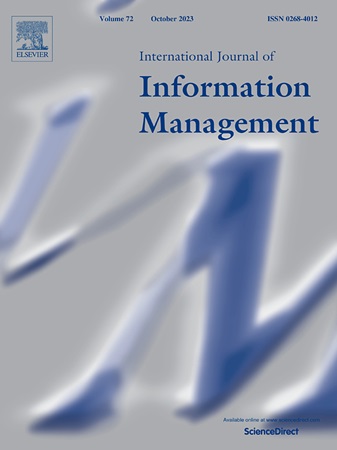Technological identity and basic psychological needs in the use of new technologies: A two-wave cross-national survey study
IF 27
1区 管理学
Q1 INFORMATION SCIENCE & LIBRARY SCIENCE
International Journal of Information Management
Pub Date : 2025-05-22
DOI:10.1016/j.ijinfomgt.2025.102926
引用次数: 0
Abstract
AI and smart technologies are increasingly embedded in almost all aspects of everyday life, and their usage might inevitably affect individuals’ self-concept and psychological and social well-being. Evidently, cross-national and longitudinal analyses of this phenomenon and its mediating factors are required. To this end, our study examined how in-group identification with new technology users influences individuals’ satisfaction of the basic psychological needs of autonomy, competence, and relatedness in the context of new technology use. We used longitudinal two-wave data collected from 18- to 75-year-old adult populations in Finland (N = 1541), France (N = 1561), Germany (N = 1529), Ireland (N = 1112), Italy (N = 1530), and Poland (N = 1533). Based on hybrid multilevel regression models, we found consistent evidence across these six European countries that individuals’ in-group identification with new technology users is positively associated with relatedness but negatively associated with autonomy and competence. Our results suggest that the level of social identification with other technology users is a meaningful social context that shapes the well-being outcomes of new technologies.
新技术使用中的技术认同和基本心理需求:一项两波跨国调查研究
人工智能和智能技术越来越多地嵌入日常生活的几乎所有方面,它们的使用可能不可避免地影响个人的自我概念以及心理和社会福祉。显然,需要对这一现象及其中介因素进行跨国和纵向分析。为此,本研究考察了新技术使用者的群体内认同如何影响个人在新技术使用背景下对自主性、能力和亲缘性等基本心理需求的满足。我们使用纵向双波收集的数据从18岁到75岁的成人人口在芬兰(N = 1541),法国(N = 1561),德国(N = 1529)、爱尔兰(N = 1112),意大利(N = 1530)和波兰(N = 1533)。基于混合多层回归模型,我们在这六个欧洲国家中发现了一致的证据,即个人对新技术用户的群体内认同与相关性呈正相关,而与自主性和能力负相关。我们的研究结果表明,与其他技术用户的社会认同水平是一个有意义的社会背景,它塑造了新技术的幸福感结果。
本文章由计算机程序翻译,如有差异,请以英文原文为准。
求助全文
约1分钟内获得全文
求助全文
来源期刊

International Journal of Information Management
INFORMATION SCIENCE & LIBRARY SCIENCE-
CiteScore
53.10
自引率
6.20%
发文量
111
审稿时长
24 days
期刊介绍:
The International Journal of Information Management (IJIM) is a distinguished, international, and peer-reviewed journal dedicated to providing its readers with top-notch analysis and discussions within the evolving field of information management. Key features of the journal include:
Comprehensive Coverage:
IJIM keeps readers informed with major papers, reports, and reviews.
Topical Relevance:
The journal remains current and relevant through Viewpoint articles and regular features like Research Notes, Case Studies, and a Reviews section, ensuring readers are updated on contemporary issues.
Focus on Quality:
IJIM prioritizes high-quality papers that address contemporary issues in information management.
 求助内容:
求助内容: 应助结果提醒方式:
应助结果提醒方式:


